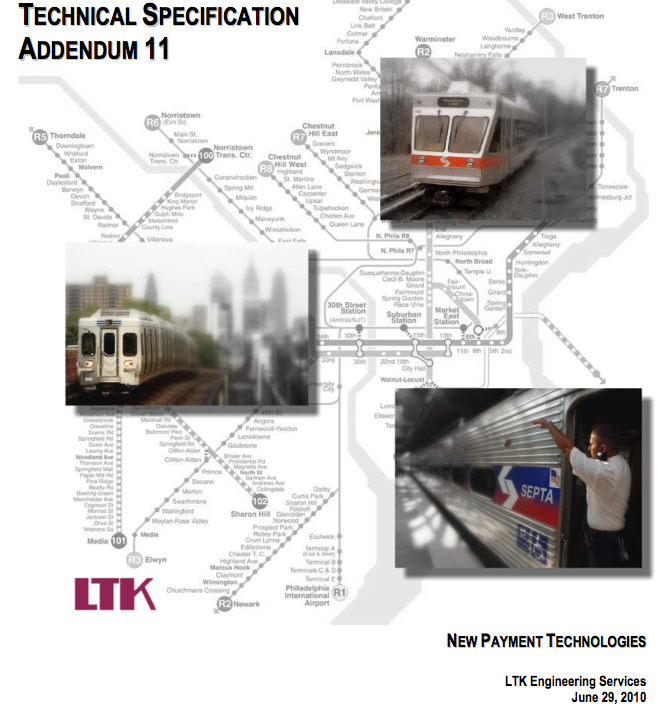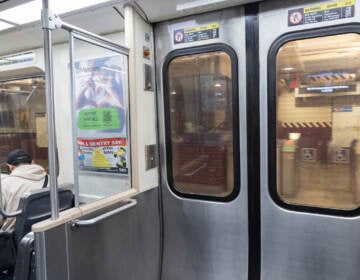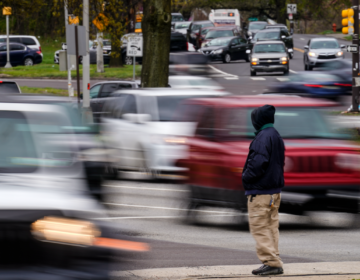A deeper look at smart card process details

Documents PlanPhilly obtained from SEPTA through an open records request several weeks ago laid out a plan for implementing a new smart card fare collection system on regional rail that could fundamentally reshape the system.
Now, the head of the smart card project has responded to criticism about the plan, saying it’s only one of several scenarios the authority’s considering and that SEPTA has gone to great lengths to solicit input on the contracting process.
The documents included a new operating scenario for regional rail that would implement a one-way fare collection system.
Riders would pay nothing to take a train into Center City, but would pay double for outbound trips. The scenario would reduce the number of fare zones and require riders to “tag” into and out of the system using their smart cards. The tag out method would vary depending on the zone riders would be traveling to.
Gates would be installed in Center City stations to ensure riders properly tag in.
Though this operating scenario sparked strong criticism from the Delaware Valley Association of Rail Passengers and SEPTA’s Citizen Advisory Committee, John McGee, SEPTA’s chief officer of new payment technologies, said it was only one of several that the authority was considering.
He explained that the documents obtained by PlanPhilly represent a series of different scenarios under which a smart card system would be implemented and that no final decision had been made on which one SEPTA will adopt.
The other options SEPTA is considering would include retaining two-way fare collection and installing new fare vending machines at every station.
SEPTA has been including these different scenarios in addenda to the authority’s original request for proposals, which seeks a contractor to design and build the system, to compare the plans’ different price tags, McGee said.
The three companies bidding for the contract were scheduled to come back with their prices for this scenario around Labor Day.
McGee added that, once vendors return bids for this scenario, SEPTA will test the “reasonableness” of the bids it gets back and may add another addendum to the RFP to get more information from bidders and to make further modifications.
The SEPTA Board will have a chance to review any major changes to regional rail operations when it votes on whether to award a smart card contract to the winning bidder.
The contract will contain a preferred operating scenario for the entire SEPTA system, though McGee responded to criticism from DVARP and the CAC about a lack of transparency in the bidding process by saying that the SEPTA Board won’t be bound by that scenario.
“The SEPTA Board doesn’t have its back against the wall,” McGee said, adding that if the board is opposed to the operating scenario, he and his team could resume the bidding process by adding more addenda on to the RFP or by starting with a new RFP.
McGee said the outline that’s in the contract would be fleshed out ― in the form of fare and tariff changes ― in the 18 to 24 month window after a contract is awarded and before the system is operational.
In that time, decisions will be made on operational details, like the number and size of new fare zones and changes to SEPTA fare structure. The SEPTA Board will then vote on these proposed changes after a legally mandated public hearing process.
McGee said it doesn’t make sense for the board to vote on tariff changes earlier in the process because SEPTA’s ridership patterns and financial situation might change in the lag time between the award of the contract and the rollout of the smart card.
At the same time, he said the contract would be structured to allow the maximum amount of flexibility going forward.
The SEPTA Board will have “the maximum amount of freedom” to make decisions on major policy issues, McGee said.
Equipment, such as possible fare gates for Center City regional rail stations, will be designed to accommodate changes in the operating scenario, he said.
SEPTA officials also responded to criticism that they were moving ahead with a smart card project without adequate consultation of stakeholders, elected officials or riders.
McGee said that SEPTA has “gone to a great extent to collect input” from them, in the form of briefings, focus groups and studies of SEPTA riders.
“We’ve collected their thoughts,” he said, adding that “we’ve not overlooked a single priority” they said was important.
Now that SEPTA has collected this input, it’s time for the authority to step back and make a decision, spokeswoman Jerri Williams said. According to Williams the authority is playing the role of “a parent doing what’s right for the rider.”
This approach hasn’t totally allayed DVARP’s concerns, however.
Matt Mitchell, who represents the transit advocacy group, said he wants “at minimum a public meeting” on implementing smart cards on regional rail.
That meeting, he said, should occur after SEPTA staff decides on a preferred operating scenario and before the contract is put before the SEPTA Board for a vote.
He cited the open houses held in South Jersey for the Delaware River Port Authority proposed light rail line as an example.
Mitchell said that, though there’s widespread agreement on how smart cards should be implemented on the transit side, there are “enough open questions” for regional rail that the public deserves a say.
He also wants SEPTA to perform studies on how ridership and revenue would change on regional rail for each of the operating scenarios the authority’s contemplating.
This, he argued, would provide a way for the SEPTA Board to evaluate the scenario it’s presented with.
For his part, McGee said that SEPTA has conducted extensive studies of its ridership, including conducting focus groups and surveys.
As for public meetings, Williams said SEPTA is planning on holding an “open house” to get public input on new equipment, like fare gates or fare vending machines, to help it develop a user-friendly system.
She added that SEPTA isn’t required by law to hold a meeting on any changes to regional rail operations and that a decision on whether to hold a similar kind of open house on that issue hasn’t been decided.
Contact the reporter at acampisi@planphilly.com
WHYY is your source for fact-based, in-depth journalism and information. As a nonprofit organization, we rely on financial support from readers like you. Please give today.






